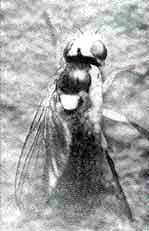Imported insects
 THE INDIAN cotton crop, already attacked by several insects resistant to most insecticides, is now falling prey to a new insect -- the American serpentine leaf-miner. Scientists suspect this new threat, a native of southern USA, entered the country in 1990-91, probably from Kenya or Europe, along with chrysanthemum cuttings. The leaf-miner has also damaged castor, sunflower, mung bean, urad bean and other crops. Interestingly, this insect does not appear to attack cotton in other parts of the world (Indian Farming, Vol 43, No 2).
THE INDIAN cotton crop, already attacked by several insects resistant to most insecticides, is now falling prey to a new insect -- the American serpentine leaf-miner. Scientists suspect this new threat, a native of southern USA, entered the country in 1990-91, probably from Kenya or Europe, along with chrysanthemum cuttings. The leaf-miner has also damaged castor, sunflower, mung bean, urad bean and other crops. Interestingly, this insect does not appear to attack cotton in other parts of the world (Indian Farming, Vol 43, No 2).
Says G C Tewari, a scientist at the Indian Council of Agricultural Research, "This insect is now a very serious problem, especially since it is resistant to most insecticides, and can develop resistance to new pesticides quickly." Moreover, scientists suspect that it may also carry several plant pathogens, bringing with it bacterial and fungal diseases.
Several studies have been initiated in different universities by ICAR and an attempt is being made to understand the insect's biology and range. In preliminary trials, scientists have found it can be controlled on tomato by a neem seed kernel extract.
Related Content
- Order of the National Green Tribunal regarding pollution of storm water drain, Damoh, Madhya Pradesh, 06/3/2024
- GM maize in Ethiopia: An ex ante economic assessment of TELA, a drought tolerant and insect resistant maize
- Hermetic bag for the storage of maize: economic perspective in different Sub-Saharan African countries, food security and greenhouse gas emissions
- Hermetic bag for the storage of maize: economic perspective in different Sub-Saharan African countries, food security and greenhouse gas emissions
- More than dozen wild bee species declining in Northeastern U.S.
- Environmental impacts of genetically modified (GM) Crop use 1996–2016: impacts on pesticide use and carbon emissions
